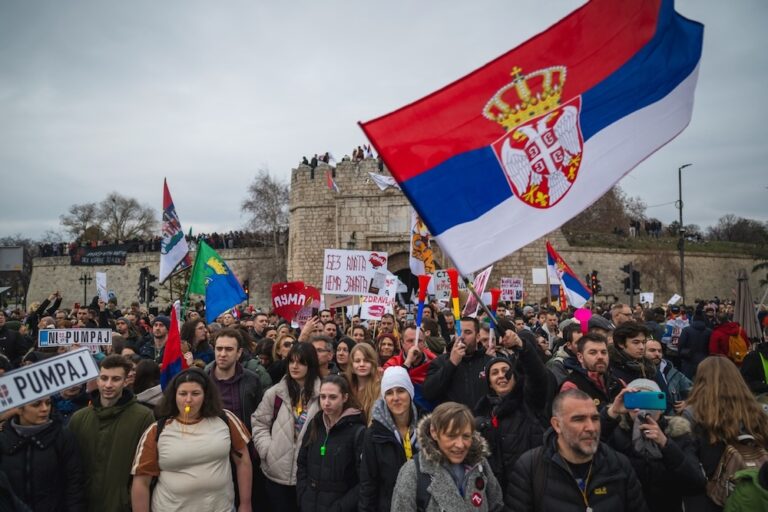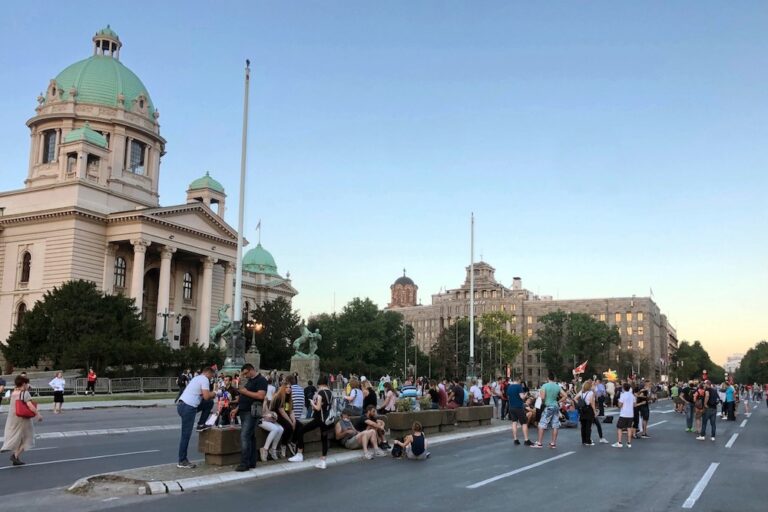**Updates IFEX alert of 20 March 2000** (RSF/IFEX) – The following is an RSF press release: 22 March 2000 PRESS RELEASE Serbia Lock-down on the media Twenty media outlets threatened and ten others closed since the beginning of the year Repression of independent and opposition media in Serbia has never been this bad. Since the […]
**Updates IFEX alert of 20 March 2000**
(RSF/IFEX) – The following is an RSF press release:
22 March 2000
PRESS RELEASE
Serbia
Lock-down on the media
Twenty media outlets threatened and ten others closed since the beginning of the year
Repression of independent and opposition media in Serbia has never been this bad. Since the beginning of 2000, not less than twenty press outlets have been victims of state reprisal. The closure of the municipal radio-television stations Kraljevo (central) and Pirot (south-east) brings the number of media outlets closed or suspended to ten. Since last February, Serbian officials’ threats and verbal agressions against the press have multiplied and “media cleansing” is increasing throughout the country.
On 18 March, under the pretext that the channel was functioning without a licence, inspectors from the federal Ministry of Telecommunications seized the transmitter of municipal radio-television station of Kraljevo (100 km south of Belgrade), a city run by the opposition, thus depriving 800,000 people of their programmes. Demonstrations of up to 10,000 people have been organised every day since the seizure to protest the action. Two days earlier, the municipal television station of Pirot (a city of 70,000 inhabitants located in the country’s south-eastern region) had the same fate. On 12 March, under the same pretext, the municipal radio-television station in Pozega, a city which is also controlled by the opposition, was also closed down, despite residents’ protests.
Attacks against electronic media in cities controlled by the opposition have also increased since the beginning of the year. On 8 March, the minister of telecommunications had already proceeded with the closure of Boum 93, a private radio station in Pozarevac (60 km east of Belgrade). The next morning two more private media outlets, the radio station Tir and the television channel Nemanja, in Cuprija (100 km south of Belgrade), were also suspended. In Nis, the country’s second largest city, the television channel TV5 faces possible closure: the Yugoslav army, which owns the premises, has ordered the directors to vacate the premises by 25 April, at the latest. According to the station’s directors, TV5 holds a ten year contract on their office space.
Economic pressure and vandalism continue to be used to dampen the media’s impulse for independence. On 29 January, the regional offices of the daily “Blic” in Kragujevac were ransacked by unknown individuals. In mid-February, some of the “Novine Vranjske” newspaper’s equipment was stolen by burglars. On 6 March, the television channel Studio B, controlled by the opposition Serbian Renewal Movement (Mouvement serbe du renouveau, SPO) in Belgrade, also fell victim to acts of vandalism perpetrated by individuals in police uniforms.
On 28 January, the printer ABC, which publishes the private daily “Glas Javnosti”, with a circulation of 200,000 copies, became the object of bankruptcy proceedings. The daily and its counterpart “Blic” were ordered by the authorities to lower their sales price. On 3 March, Dusan Cuvik, an individual closely connected to the regime, was instated as editor-in-chief of the widely circulated daily “Vecernje Novosti”. The government had decided to regain control of the powerful Novosti press group by contesting the legality of its privatisation.
The newspapers “Nedeljne Novine” and “Nezavisna svetlost” were sentenced to pay a fine of 100,000 dinars (9,000 euros) under provisions of the information law. In February, the weekly “Nin” and the daily “Vecernje Novosti” had to each pay 150,000 dinars (13,500 euros). The daily “Danas” must pay a fine of 300,000 dinars (27,000 euros), which brings the fines imposed on it since October 1998, when the information law was adopted, to a total of 1,850,000 dinars (166,500 euros). On 10 March, the weekly “Srpska rec”, published by the SPO, was forced to pay a fine of 450,000 dinars (40,500 euros). On 6 March, the television station Studio B was also sentenced to 450,000 dinars (40,500 euros). The station had already paid 300,000 dinars (27,000 euros) in February. One week later, the station paid all its debts, which totalled 11 million dinars (1 million euros) to the Telecommunications Ministry, in order to avoid being closed down. The same day, the ministry ordered more than 200 radio stations and television channels to pay a licencing fee by 31 March, for the use of their broadcasting frequencies.
Reporters sans frontières (RSF) calls on the representatives of the international community, and most notably the United Nations (UN) Special Rapporteur on Human Rights in Former Yugoslavia, Mr. Jiri Diensbier, to do everything in their power to put an end to the repression of independent and opposition media in Serbia.


